Spoiler Alert: article reveals end of the film Avatar.
In James Cameron’s newest film Avatar an alien tribe on a distant planet fights to save their forest home from human invaders bent on mining the planet. The mining company has brought in ex-marines for ‘security’ and will stop at nothing, not even genocide, to secure profits for its shareholders. While Cameron’s film takes place on a planet sporting six-legged rhinos and massive flying lizards, the struggle between corporations and indigenous people is hardly science fiction.
For decades real indigenous tribes around the world have faced off with corporations—mining, logging, oil and gas—determined to exploit their land. These corporations, much like the company in the film, usually have support from the government and access to ‘security forces’, sometimes in the form of ex-military or state police. Yet unlike the film, in which the indigenous group triumphs over the corporate and military invaders, the real-life stories of indigenous tribes rarely end justly: from Peru to Malaysia to Ecuador their struggles continue.
Spears versus guns
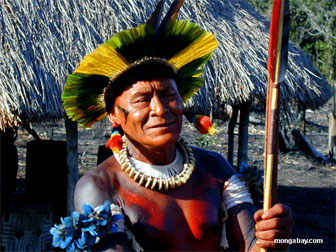 Kayapo shaman in Brazil |
In Avatar the indigenous tribe, called the Na’vi, use poison-tipped arrows to defend themselves against the guns, gas, and explosions used by the human invaders. Art imitates life: in June of this year, violence erupted in Peru as heavily-armed police clashed with indigenous protestors, some carried spears, others were unarmed.
The indigenous tribes were protesting nearly 100 new rules pushed through the Peruvian government—led by President Alan Garcia—that made it easier for foreign companies to exploit oil, gas, timber, and minerals on indigenous land. The violent skirmish that followed led to the deaths of 23 police officers and at least 10 indigenous people—with indigenous groups saying the government went to great lengths to hide/dispose of bodies to make it appear that fewer natives were killed. Bodies were allegedly dumped in rivers.
What is known is that 82 protesters suffered gunshot wounds and 120 in total were injured in the melee. Protesters say tear gas was used; in addition some say machine guns—shown in photos—were fired at them.
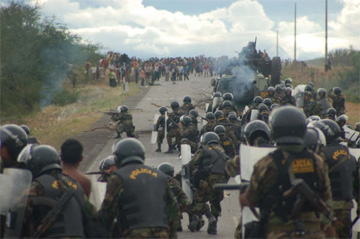 Peruvian security forces killing indigenous protesters in Peru. Photo © 2009 Marijke Deleu |
Just weeks after the bloody incident, Texas-based Hunt Oil, with full support of the Peruvian government, moved into the Amarakaeri Communal Reserve with helicopters and large machinery for seismic testing. A scene not unlike Avatar, which shows a corporation entering indigenous territory with gun ships. The seismic testing alone involves 300 miles of testing trails, over 12,000 explosive charges, and 100 helicopter land pads in the middle of a largely-untouched and unknown region of the Amazonian rainforest. The reserve, which was created to protect native peoples’ homes, may soon be turned into a land of oil scars. Indigenous groups say they were never properly consulted by Hunt Oil for use of their land.
Many of the rules put forth by the government that led to the protest have since been determined unconstitutional, while Garcia has rescinded two rules. Still Garcia says—as evidenced from Hunt Oil—that he plans to move forward with controversial oil and gas development on tribal lands in the Amazon.
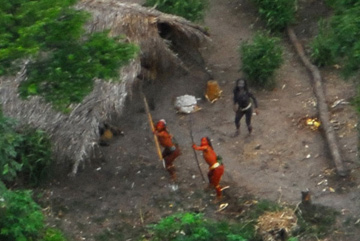 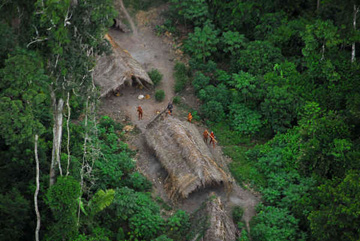 Photos of an uncontacted tribe in the Terra Indigena Kampa e Isolados do Envira, Acre state, Brazil, near the border with Peru, caused a stir when they were released by Survival International, an NGO, in May 2008. The indigenous group is said to be threatened by oil exploration in the area. © Gleison Miranda/FUNAI. |
Areas of the region slated for development are also home to uncontacted Amazonian tribes. Garcia has repeatedly called into question the existence of any such tribes, though aerial photos recently showed uncontacted natives armed with spears near the area in question. The leases under protest are a part of the Free Trade Agreement signed by both the United States and Canada.
In the film the Na’vi are dismissed as “blue monkeys” and “savages” by the corporate administrator. Both the corporation and their hired soldiers view the Na’vi as less than human.
In Peru, President Alan Garcia has called indigenous people “confused savages”, “barbaric”, “second-class citizens”, “criminals”, and “ignorant”. He has even compared tribal groups to the nation’s infamous terrorists, the Shining Path.
There is no end in sight in the struggle between the indigenous people of Peru and government-sanctioned corporate power.
Decades of oppression in Borneo: violence, rape, murder
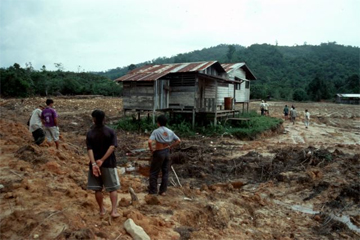 In March 2006, the bulldozers belonging to Interhill, a Malaysian logging company, reached Ba Abang, a Penan village in the Middle Baram region. 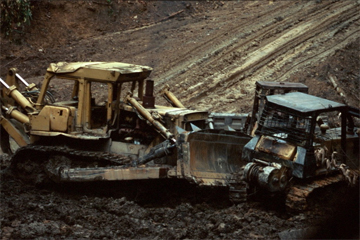 Since the late 1980s, Interhill has been cutting down rainforests in a 55,000 hectare timber concession in Sarawak’s Middle Baram region. Photos and captions by the Bruno Manser Fund |
Across the world, another people are fighting to save their homes from corporate exploitation. The Penan people of Malaysian Borneo have suffered greatly from industrial loggers entering their ancestral home: not only has the tribe lost forest land and important tribal sites, including burial grounds, to bulldozers and chainsaws, but the Penan people have faced violence, rape, and even alleged murder.
The struggle began when industrial logging first appeared in the area in the 1980s and today shows no sign of abatement or resolution. In fact, a new threat has risen in recent decades as logged forests are swiftly turned into industrial oil palm plantations, excluding any chance of the natural forest returning after logging or of natives receiving their land back.
The Penan—some of whom live as nomadic hunter-gatherers in the forest—have fought corporate loggers through lawsuits and road barricades. In turn they faced violence from Malaysian police and security forces hired by powerful logging companies. Some even fear for their lives. In 2008 longtime Penan chief, Kelesau Naan, was allegedly murdered for his long activism against logging on tribal lands. When his body was finally found—after two months—it was discovered that several of his bones were broken, leading the Penan to believe he was murdered for his opposition to the destruction of his tribe’s traditional lands. Prior to this, two Penan activists disappeared mysteriously in the 1990s and Swiss-activist, Bruno Manser, who fought long and hard for Penan rights, vanished in the region in 2000.
Recently, Penan girls have come forward to say that they were raped, beaten, and sexually abused by logging employees. A 110-page report released this year by the Malaysian Ministry for Women, Family and Community Development has documented their stories, while a government team investigating the matter stated that at least eight allegations of rape or sexual abuse were “certainly true”. Girls as young as ten were assaulted and raped, some becoming pregnant. The Penan girls, who receive rides to-and-from school by loggers, have said that it was common to be sexually abused during these rides. Yet a probe by the police into the matter went nowhere due to lack of evidence.
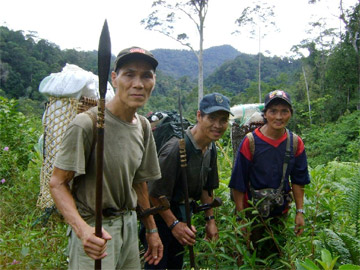 Former regional Penan chief of the Upper Baram region, James Laloh Keso (center). Photo courtesy of the Bruno Manser Fund. |
Just this month the rapes were dismissed by government official, James Masing, the Sarawak Minister for Land Development. The Minister told the BBC that in regards to the rapes the “Penan are very good story tellers. They change their stories, and when they feel like it.”
Most recently, the Penan people have tried a new strategy to preserve their dwindling home. Seventeen tribes of the Penan declared a ‘peace park’ covering 163,000 hectares of their ancestral home in order to bring light to their situation and pressure the government to halt plans for logging in the area. The government refused to recognize the status of the peace park and logging is slated to continue.
Few indigenous people have faced more tragedy, despair, and humiliation over the past thirty years than the Penan.
The curse of oil
A battle of a different kind is ongoing in Ecuador. Oil giant Chevron is currently in a $27 billion lawsuit with Ecuadorian indigenous tribes for environmental damage caused by Texaco, a company acquired by Chevron in 2001. In court Texaco has admitted to dumping 18 billion gallons of toxic waste inside Ecuador’s rainforest from 1964-1990. A court expert found contamination at every one of Texaco’s former well sites, estimating oil damages 30 times larger than the infamous Exxon-Valdez spill and spanning an area the size of Rhode Island.
The case, known to some as the ‘Amazon Chernobyl’, involves 30,000 indigenous Ecuadorian plaintiffs. The toxic spill impacted six indigenous tribes, one of which has vanished entirely. The court has found that over 1,400 people have suffered untimely deaths from cancer due to contamination from the oil spill.
 World of Avatar: in real life January 13, 2010 A number of media outlets are reporting a new type of depression: you could call it the Avatar blues. Some people seeing the new blockbuster film report becoming depressed afterwards because the world of Avatar, sporting six-legged creatures, flying lizards, and glowing organisms, is not real. Yet, to director James Cameron’s credit, the alien world of Pandora is based on our own biological paradise—Earth. The wonders of Avatar are all around us, you just have to know where to look. |
Despite these facts, Chevron has gone to great lengths to avoid reparations for environmental damage. In 2008 it was revealed that Chevron hired key political players, including former Senate majority leader Trent Lott and John McCain fund-raiser Wayne Berman to lobby United States Trade Representative Susan Schwab, members of Congress, and Deputy Secretary of State John Negroponte to threaten suspending US trade preferences with Ecuador until the lawsuit was dropped. But the corporation’s attempt to use US political power to disenfranchise 30,000 indigenous people failed.
Then this September Chevron released a video that it said proved Ecuadorian officials, including the presiding judge, were taking bribes on the case. However, the video turned out to be a fake: the business man in the video is in fact a convicted drug felon and another person in the video is an Ecuadorian contractor who has received payments from Chevron. Both the bribe and the bribers in the video were faked and others appearing in the video say the footage was heavily edited. Chevron denies that they were in any way involved in making the video.
The lawsuit has been ongoing since 2003 and a ruling has not yet been made. But Chevron has stated publically that even if it loses the case it won’t pay any damages.
“We’re not paying and we’re going to fight this for years if not decades into the future,” according to Chevron spokesman Don Campbell.
This year a documentary Crude detailing the struggle by indigenous people to hold Chevron accountable was released in theatres. Chevron’s responded with a PR campaign to disparage the film-maker and the indigenous victims [Editor’s note: Chevron’s PR efforts included posting comments on mongabay.com articles].
No happy Hollywood ending
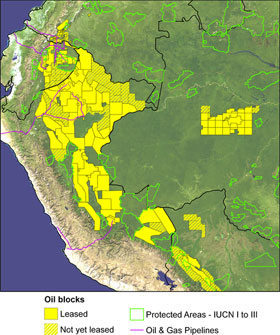 Oil and gas blocks in the western Amazon. Solid yellow indicates blocks already leased out to companies. Hashed yellow indicates proposed blocks or blocks still in the negotiation phase. Protected areas shown are those considered strictly protected by the IUCN (categories I to III). Image courtesy of PLoS ONE |
While the film Avatar ends with the indigenous aliens securing their home from corporate and military invaders, in reality that outcome is rare. Often these conflicts drag on for decades with the indigenous tribes, despite best efforts, tragically losing their home bit-by-bit. Forests are decimated, biodiversity lost, carbon released into the atmosphere, and the tribe is slowly weakened and destroyed from without, their culture and traditions attacked at the same time as their territory is knocked down.
Despite the repeated unjustness, rarely do these stories reach the mainstream media in the industrial world. Companies act with impunity, devastating forests and homes in part to feed the insatiable appetites of developed and emerging economies for furniture, oil palm, gas, and crude oil.
While Avatar is a fun, showy film that many may view as simple sci-fi entertainment, the film clearly alludes to struggles and injustices that one doesn’t need to travel across the galazy to see, but are occurring right here on planet Earth.
Some notable organizations working with indigenous groups to secure their rights: Amazon Watch, Bruno Manser Fonds, Amazon Conservation Team, and Survival International.
Related articles
Malaysia to allow logging in indigenous ‘peace park’ to proceed
(12/17/2009) Malaysia, the country with the fastest rate of greenhouse gas emissions growth since 1990 among middle and upper income countries, will allow logging to proceed in a contested rainforest area in Sarawak, on the island of Borneo.
Rainforest tribe sues the Malaysian government for enabling deforestation
(12/10/2009) Five Penan rainforest communities are suing the Sarawak state government and the Malaysian timber giant Samling for violation of their native customary rights, reports the Bruno Manser Fund, a group that works on behalf of indigenous groups in Malaysia.
Cattle company bulldozing UNESCO site, threatening uncontacted natives

(12/09/2009) A Brazilian ranching company is bulldozing land within UNESCO Chaco Biosphere Reserve in Paraguay, home to the only uncontacted natives outside of the Amazon in South America. While the UNESCO status provides no legal protections to the area, it is meant as an international marker to protect the tribe of the Ayoreo-Totobiegosode and the forest they inhabit.
Malaysian land minister attacks credibility of young indigenous rape victims
(12/07/2009) Speaking to the BBC, James Masing, Sarawak Minister for Land Development, dismissed claims by Penan girls and women who said they had been sexually abused and raped by logging workers in a remote jungle area.
Rainforest tribe declares ‘peace park’ to defend lands from logging in Sarawak
(11/30/2009) In an attempt to block destructive logging of their traditional land, a group of indigenous Penan has declared a “peace park” in the Upper Baram region of Sarawak in Malaysian Borneo, reports the Bruno Manser Fund.
Crisis averted for now, Peruvian natives will meet with Hunt Oil
(10/28/2009) Indigenous groups in a dispute with Hunt Oil, over the company performing seismic tests their land, have scheduled a meeting with the Texas based oil corporation, according to Reuters.
Amazonian natives say they will defend tribal lands from Hunt Oil with “their lives”

(10/25/2009) Indigenous natives in the Amazon are headed to the town of Salvacion in Peru with a plan to forcibly remove the Texas-based Hunt Oil company from their land as early as today. Peruvian police forces, numbering in the hundreds, are said to be waiting in the town. The crisis has risen over an area known as Lot 76, or the Amarakaeri Communal Reserve. The 400,000 hectare reserve was created in 2002 to protect the flora and fauna of the area, as well as to safeguard watersheds of particular importance to indigenous groups in the region.
Heavy oil pollution remains in Amazon, despite company claiming clean-up is finished
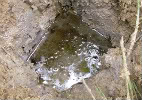
(09/17/2009) A new report shows that the Corrientes region of the Peruvian Amazon, which suffered decades of toxic contamination by Occidental Petroleum (OXY), is far from being cleaned-up. The survey, conducted by US non-profit E-Tech International, found that heavy metals, volatile organic compounds, and hydrocarbons still exist at levels above the safety limits set by Peru and continue to threaten the Achuar indigenous community, who have long fought against the oil companies.
Fifteen indigenous leaders arrested in Borneo for protesting dams that would flood their lands
(09/16/2009) After attempting to send a memorandum of protest against two dam proposals to the Sarawak Chief Minister Taib Mahmud, fifteen indigenous leaders were arrested in Kuching, Sarawak, reports the non-governmental organization the Burno Manser Fund.
Independent review finds logging company has abused rights of indigenous Penan in Borneo

(09/15/2009) An independent review of Interhill Logging found that the Sarawak logging company has regularly violated forest laws and abused the rights of the indigenous Penan peoples. The review, conducted by French tourism giant ACCOR, found that Interhill Logging had not received free, prior, and informed consent from the local Penan people for its logging operations; the logging being done by Interhill “is very definitely not sustainable”; the company is not fully compiling with Sarawak’s Natural Resources and Environment Board; and Interhill is providing no long-term benefits to the Penan peoples.
Power, profit, and pollution: dams and the uncertain future of Sarawak
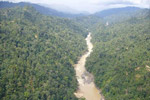
(09/03/2009) Sarawak, land of mystery, legend, and remote upriver tribes. Paradise of lush rainforest and colossal bat-filled caves. Home to unique and bizarre wildlife including flying lemurs, bearcats, orang-utans and rat-eating plants. Center of heavy industry and powerhouse of Southeast Asia. Come again? This jarring image could be the future of Sarawak, a Malaysian state on the island of Borneo, should government plans for a complex of massive hydroelectric dams comes to fruition. The plan, which calls for a network of 12 hydroelectric dams to be built across Sarawak’s rainforests by 2020, is proceeding despite strong opposition from Sarawak’s citizens, environmental groups, and indigenous human rights organizations. By 2037, as many as 51 dams could be constructed.
Penan tribe to continue blockade against loggers with blowpipes and spears
(09/01/2009) A meeting between the Penan indigenous tribe, Malaysian government officials, and representatives of a logging company ended without an agreement on Friday. After the meeting, a Penan spokesman declared that the group’s blockade would continue. Blockaders, dressed in traditional garb, have armed themselves with blowguns and spears.
Photos reveal illegal logging near uncontacted natives in Peru
(08/17/2009) Ariel photos show proof of illegal logging for mahogany occurring in a Peruvian reserve set aside for uncontacted natives. The photos, taken by Chris Fagan from Round River Conservation Studies, show logging camps set-up inside the Murunahua Reserve, meant to protect the uncontacted indigenous group, known as the Murunahua Indians, in the Peruvian Amazon.
Police face murder charges in killing of indigenous protesters in Peru
(08/16/2009) A federal prosecutor in Peru filed murder charges against two police generals and 15 other officers over the deaths of indigenous protesters at a roadblock in June, reports the Associated Press. The Indians were protesting new rules that would have made it easier for foreign developers to exploit oil and gas, timber, and minerals in Peru’s Amazon rainforest. The skirmish left 23 police and at least ten protesters dead.
Peru to proceed with oil and gas auctions in the Amazon despite indigenous protests
(08/07/2009) Despite violent protests by indigenous groups over plans to expand oil and gas exploration in the Peru’s Amazon rainforest, energy investments in the South American country are expected to increase to $1.5 billion in both 2009 and 2010, reports Reuters.

(08/03/2009) Barely six weeks after a dozen Amazon natives were gunned down by the Peruvian Army in the oil town of Bagua for protesting the cozy relationship between Big Oil and the government of President Alan Garcia, I find myself on the banks of the Mother of God River in Salvacion, Peru, wondering if all those folks died in vain. Any day now, the bulldozers will be moving in as Texas-based Hunt Oil Company – with the full go-ahead of the Peruvian government — fires its first salvo in its assault against the million-acre pristine rainforest wilderness of the little-known and largely unexplored Amarakaeri Communal Reserve.
Forest people set up logging blockades in Borneo
(07/31/2009) Indigenous Penan have set up roadblocks in Malaysian Borneo to stop loggers from encroaching on their rainforest land, reports Survival International, an indigenous rights’ group.
Companies benefit from reducing conflict with local people

(07/08/2009) Mechanisms to mitigate disputes with local communities, can reduce risk for companies seeking to profit from forest use while at the same time helping protect rights of forest people, argues a new report published today by the The Forests Dialogue (TFD), an international group of forest experts from business, environmental, academic and human rights groups.
Peru revokes decrees that sparked Amazon Indian uprising
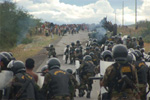
(06/19/2009) Peru’s Congress revoked two controversial land laws that sparked violent conflicts between indigenous protesters and police in the country’s Amazon region. The move temporarily defuses a two-week crisis, with protesters agreeing to stand down by removing blockades from roads and rivers. Congress voted 82-14 Thursday to overturn legislative decrees 1090 and 1064, which would have facilitated foreign development of Amazon land. Indigenous groups said the decrees threatened millions of hectares of Amazon rainforest and undermined their traditional land use rights.
Peru suspends decree that triggered bloody conflict between Indians and police
(06/11/2009) Peruvian lawmakers yesterday suspended a controversial decree that contributed to a bloody conflict between police and indigenous protesters in the country’s Amazon region, reports the AFP.
(06/06/2009) More than 70% of the Peruvian Amazon has been allocated for oil and gas extraction, and the current government of Alan Garcia has been pushing for more. Unfortunately, as usual, these policies are promoted by and only benefit a handful of people, but negatively impact the lives of many. However, Garcia’s government did not foresee the potential consequences of their actions.
Peruvian police kill 10 Indians in battle over Amazon oil drilling
(06/06/2009) At least 30 are dead following a clash between police and Indians protesting oil development in Peru’s Amazon region.